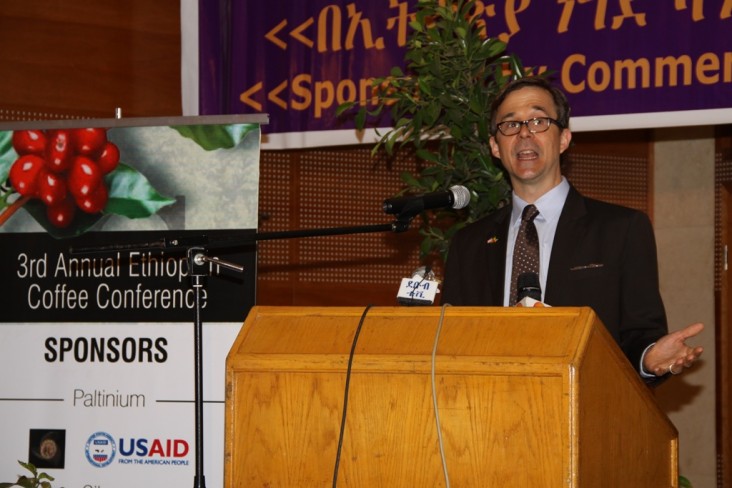
It is widely known that Ethiopia is the birthplace of Arabica coffee and exports some of the highest quality coffee in the world, including many specialty coffees such as Yirgacheffe, Harar and Sidama. Despite this long history and unique coffee culture, the Ethiopian coffee value chain has yet to realize its full potential for increased growth especially for the benefit of smallholder farmers. This is primary reason why the United States has made coffee one of the key export commodities we promote under the Presidential Feed the Future Initiative. Here in Ethiopia, the development of the coffee value chain is an important part of USAID’s Agricultural Growth Program-Agribusiness Market Development project, building on many years of previous U.S. support to the industry.
Though the coffee industry has grown and begun to modernize, more progress is needed. For example, according to a recent study by the International Food Policy Research Institute (IFPRI), 10 percent of Ethiopia’s coffee production still comes from gathering wild coffee beans in forests, 35 percent comes from partially tended wild bushes, and 50 percent is produced in small plots as a secondary crop. Only five percent of Ethiopia’s coffee is produced on plantations dedicated to coffee production.
Even more significant, the bulk of Ethiopia’s coffee is sun-dried rather than wet-washed, the latter making up just 30 percent of Ethiopian coffee exports on average. I don’t have to tell this audience the advantages of wet-washing and the lost revenues that result from selling sun-dried coffee instead of wet-washed. Going a step further, roasting coffee before export would increase its value by 200 percent according to the World Bank.
Last but not least, the international demand for products that meet “sustainability standards” is increasing. What this means is that consumers in the developed world are willing to pay higher prices for products that are produced by methods that are environmentally sound and sustainable (“organic”) and provide fair prices to producers. Ethiopian coffee is de facto “organic.” IFPRI found that only six percent of Ethiopian coffee producers use non-organic fertilizer and just two percent used chemical pesticides/herbicides. But Ethiopia has not yet branded itself sufficiently to capitalize on interest in organic production. Again, here is significant potential to increase the value-added in country.
That is why we are particularly pleased to see increasing interest on the part of American coffee retails, such as Starbucks, in Ethiopian coffee. We note there are a number of you present today. Welcome to Ethiopia!
Furthermore, USAID is working with coffee stakeholders to realize the vision of maximizing commercial returns for unique, traceable Ethiopian coffees to both conventional and specialty international markets.
To achieve this, U.S.-assisted efforts are focused on key strategies that are yielding positive results so far. In the last year, we helped to:
Increase productivity and improve quality, resulting in coffee sales of 32.6 million U.S. dollars for smallholder farmers in Ethiopia.
Upgrade and certify Ethiopian Commodity Exchange (ECX ) labs using Specialty Coffee Association of America (SCAA) standards. As a result, Ethiopia became the first country in Africa to have SCAA certified labs last year. Implement traceability in partnership with the ECX and key stakeholders, which will be rolled out in the coming season for coffee export. This will enable Ethiopia to increase its share of the higher priced specialty coffee market.
Diversify international market opportunities by helping to secure 56 million dollars in new export earnings from trade shows where we facilitated market linkages.
Introduce new technologies to increase sustainability and provide technical support to cooperatives on coffee seedling, which resulted in distribution of more than 3.4 million seedlings across Ethiopia.
I hope the exchange of information and experience over the next two days will result in learning, innovative ideas—and new business deals! The U.S. Government is proud to be a sponsor of this conference and the opportunity it provides by convening leading actors and companies, including from the U.S. and from across the global coffee sector, to assist Ethiopia to overcome any hurdles to growth and find new avenues to expand its industry.
We have seen the Ethiopian Coffee Exporters Association grow yearly and we continue to support many of the changes underway to significantly improve production, exports, and traceability of Ethiopia’s quality coffees.
The United States will continue to be a committed partner in the development of Ethiopia’s coffee trade and its legion of smallholder growers.
Thank you.
See Also
Press Release Coffee Conference [PDF, 24KB]
Press Release Coffee Conference (Amharic) [PDF, 254KB]







Comment
Make a general inquiry or suggest an improvement.